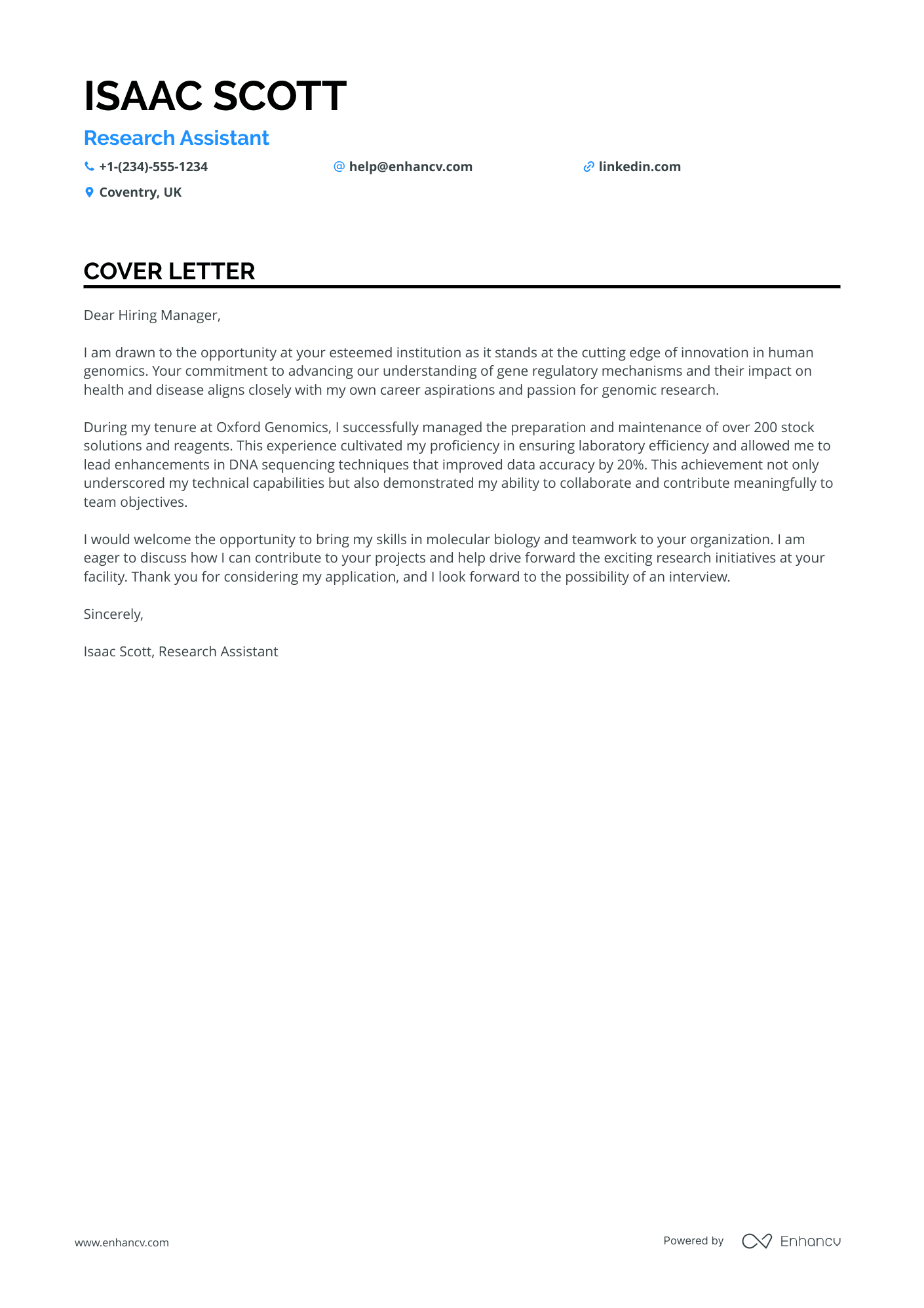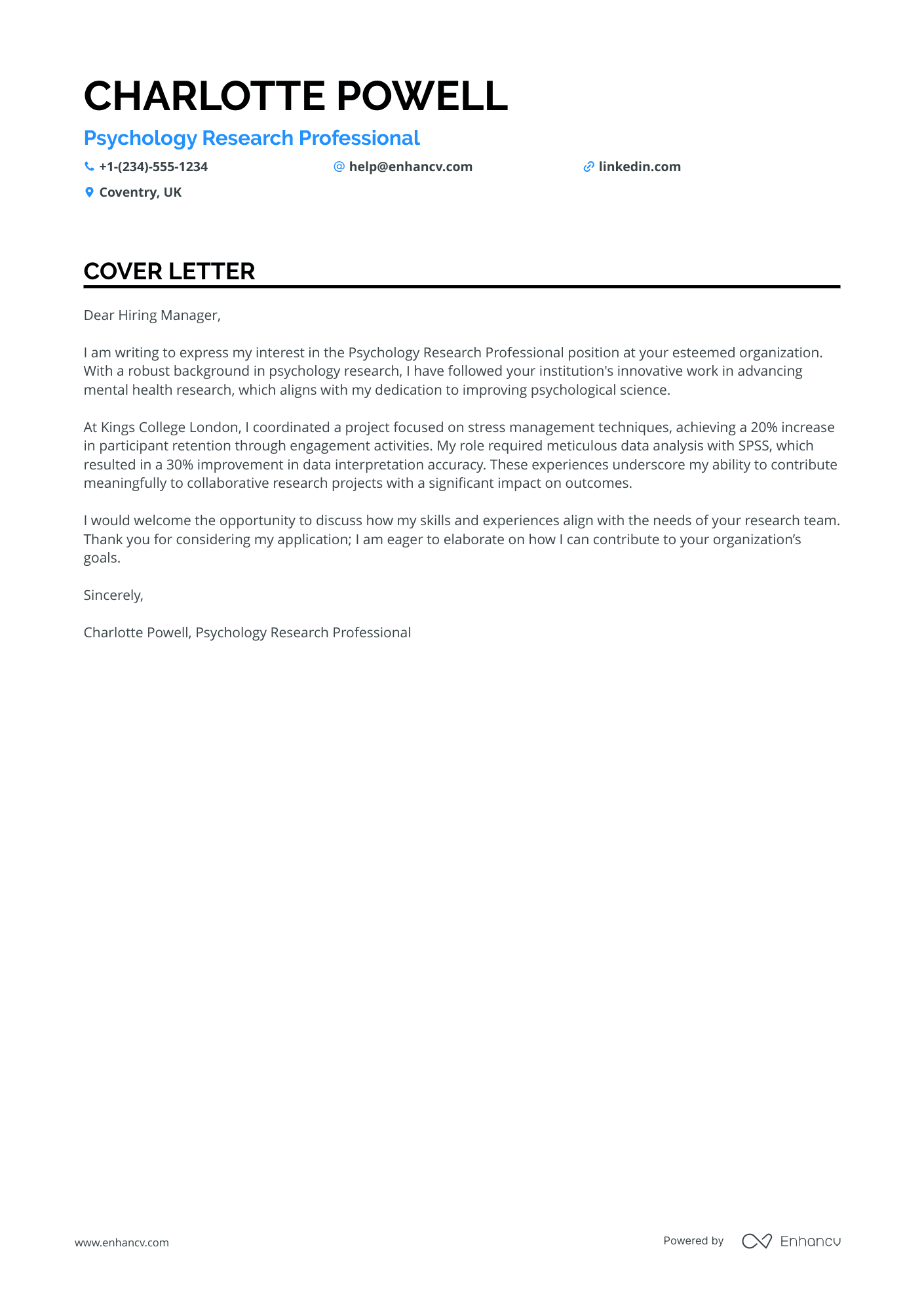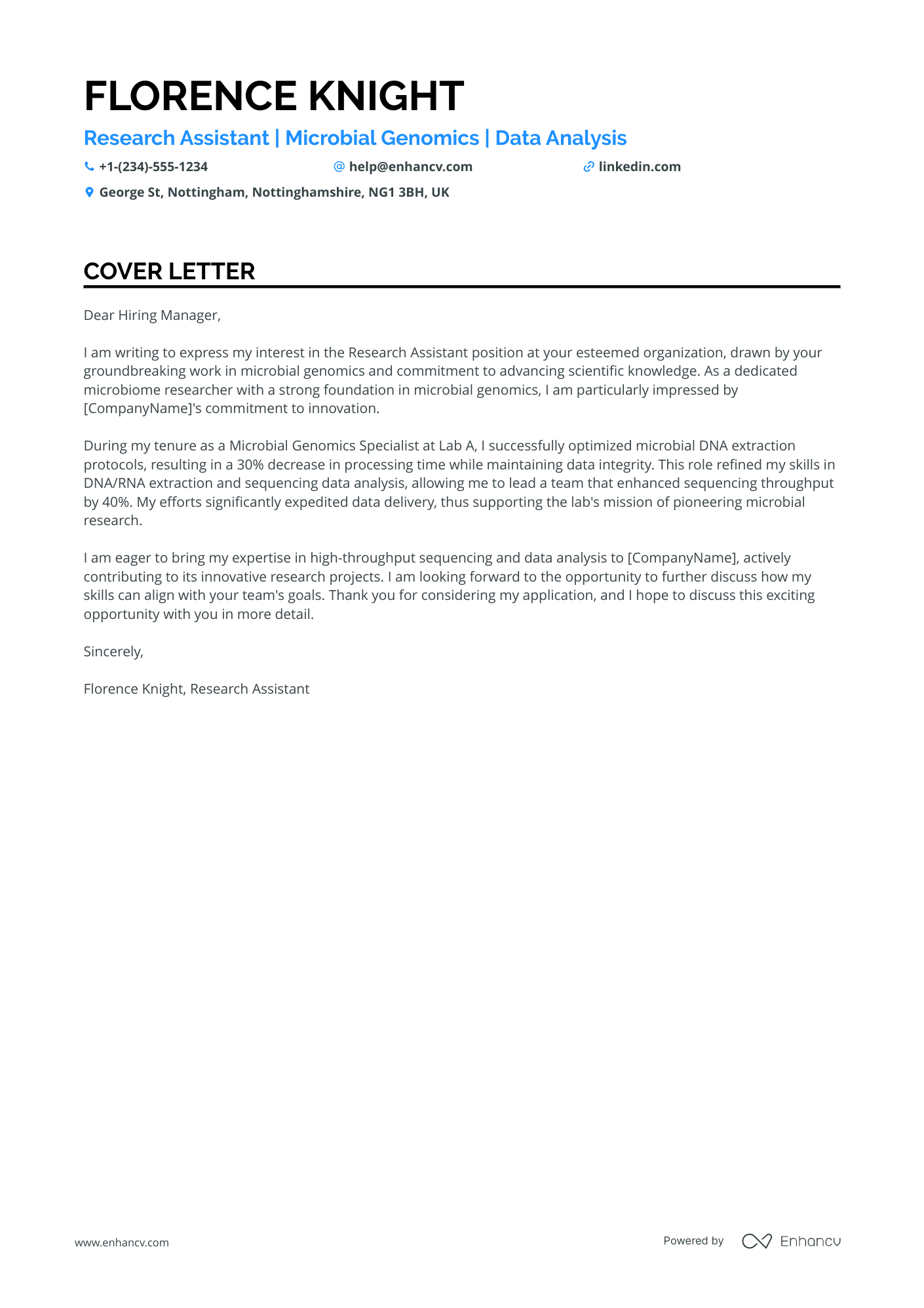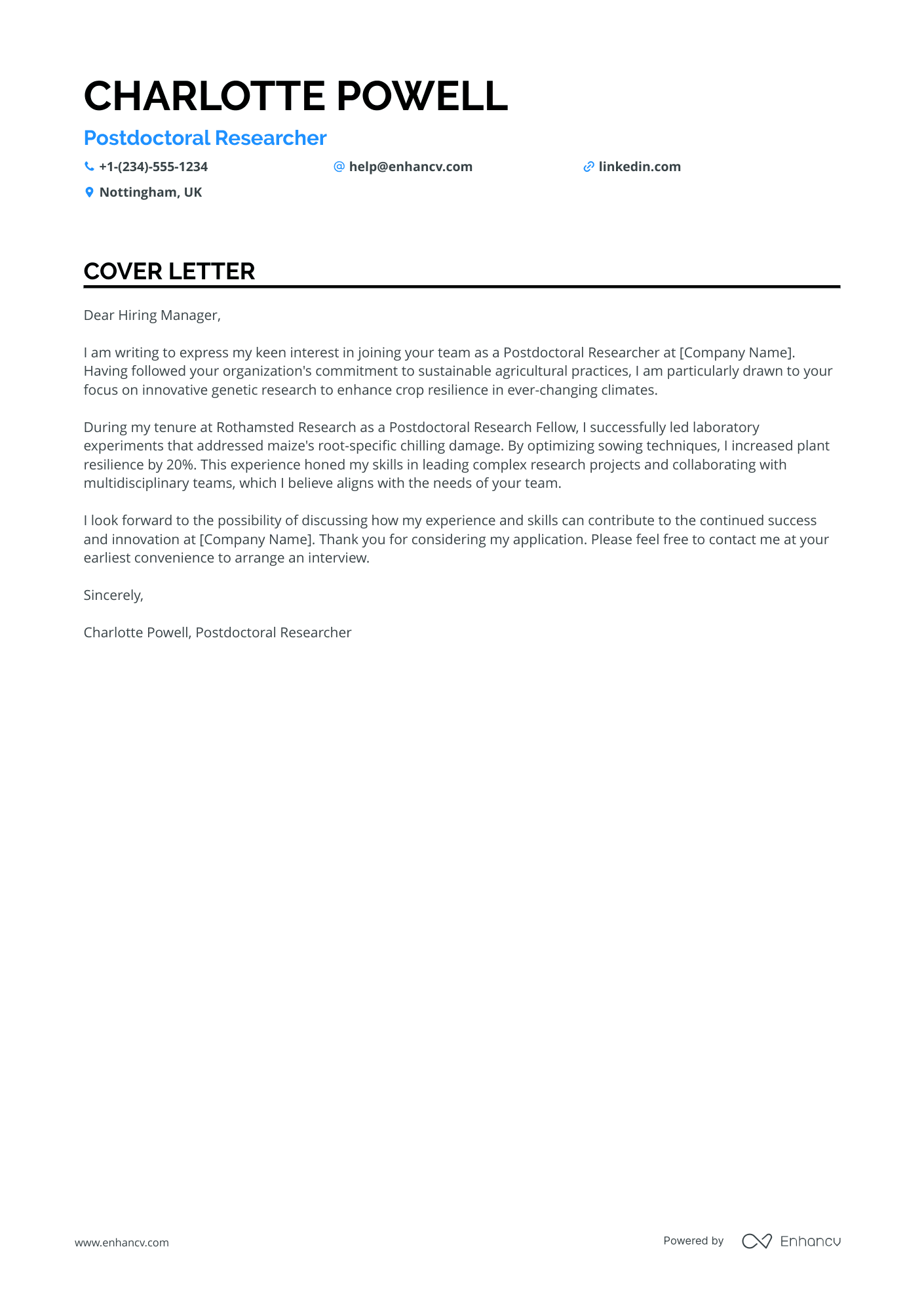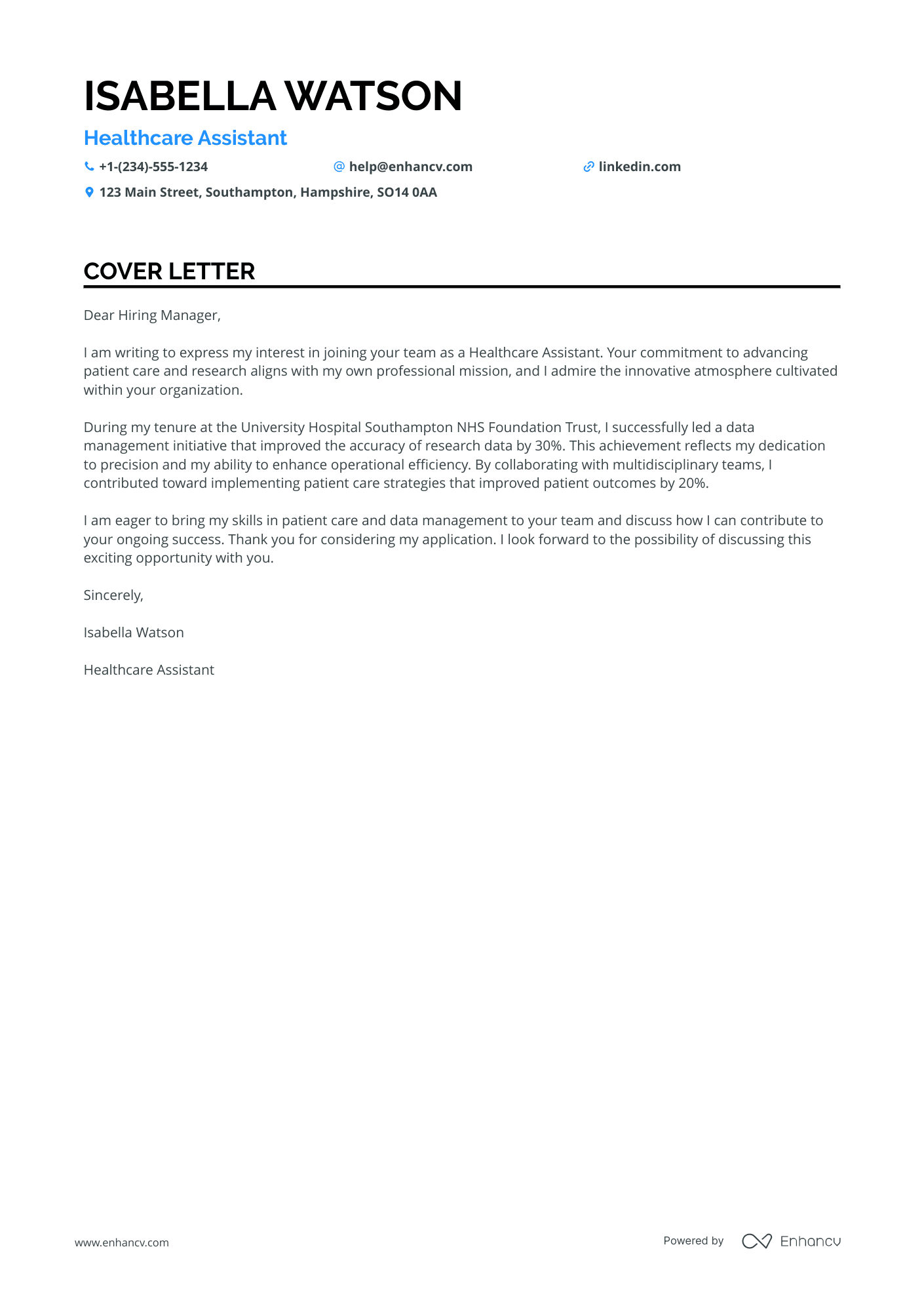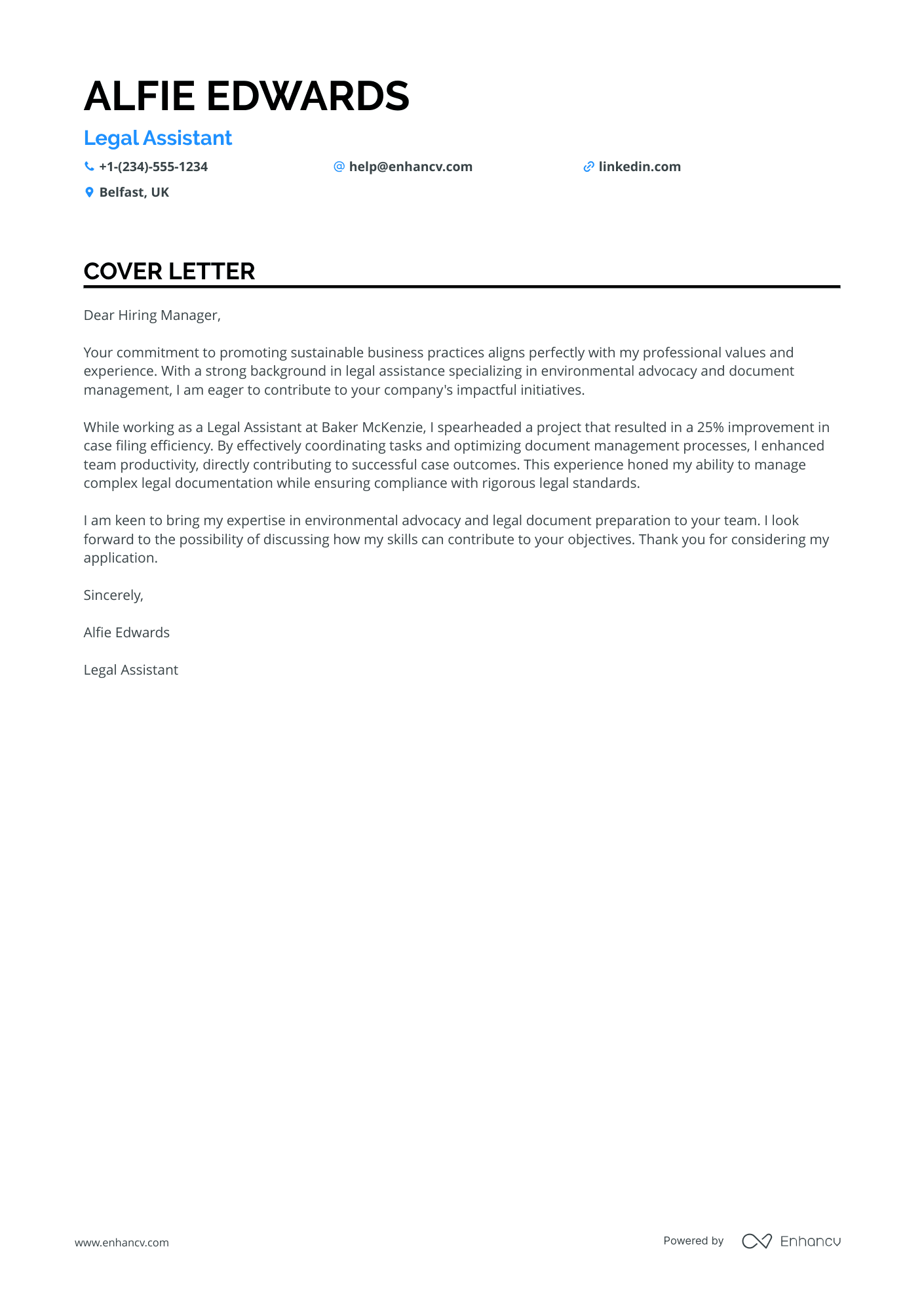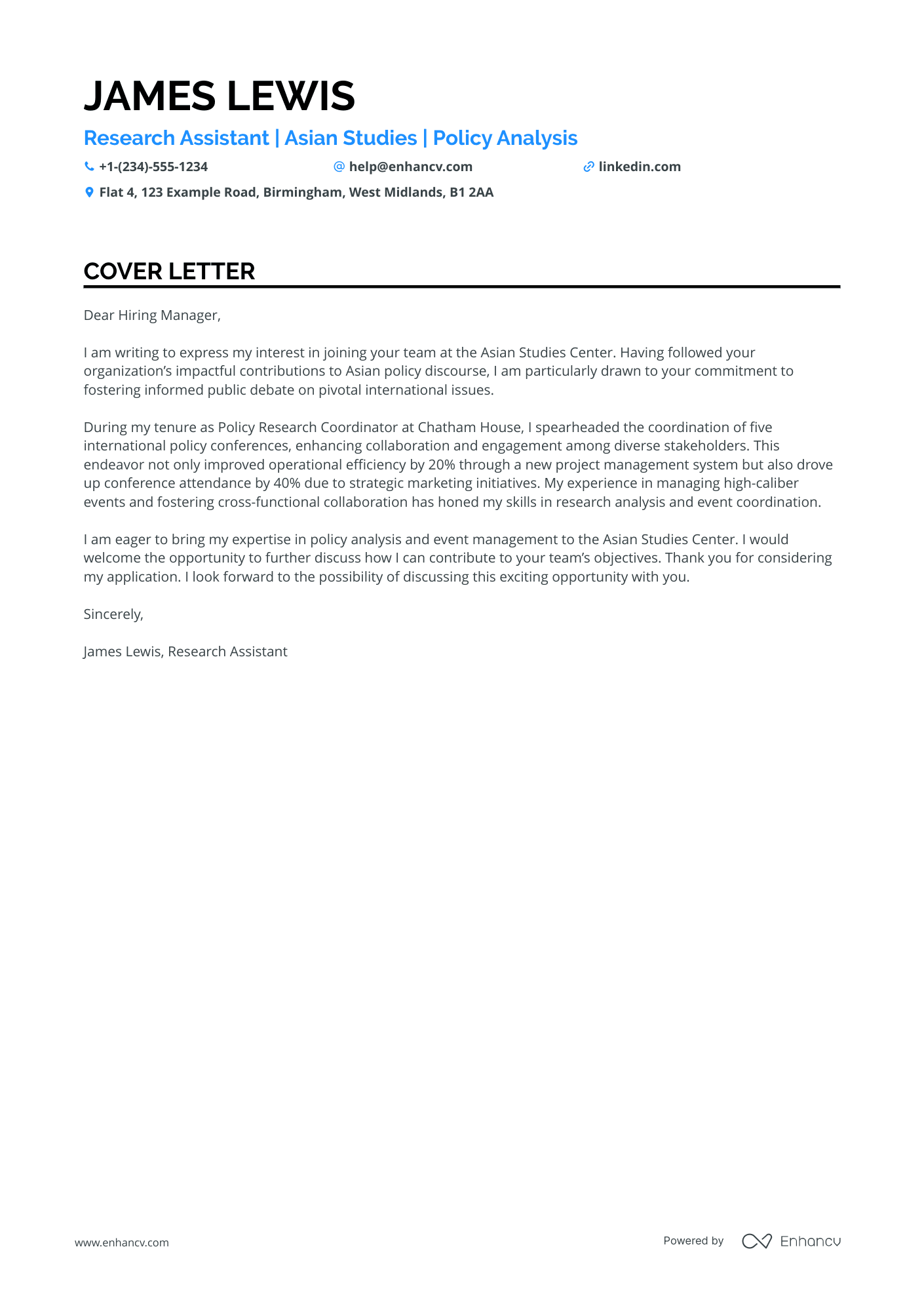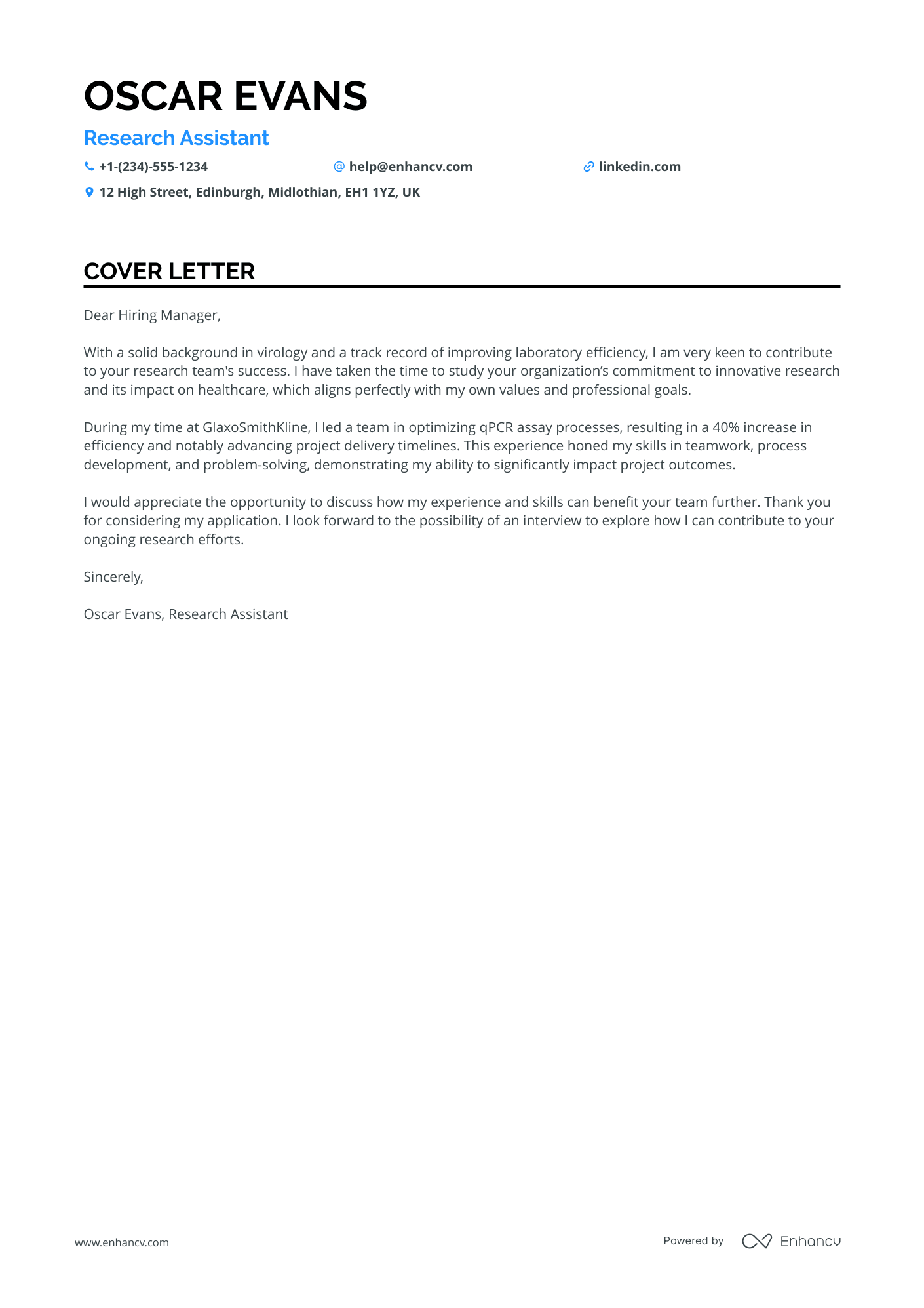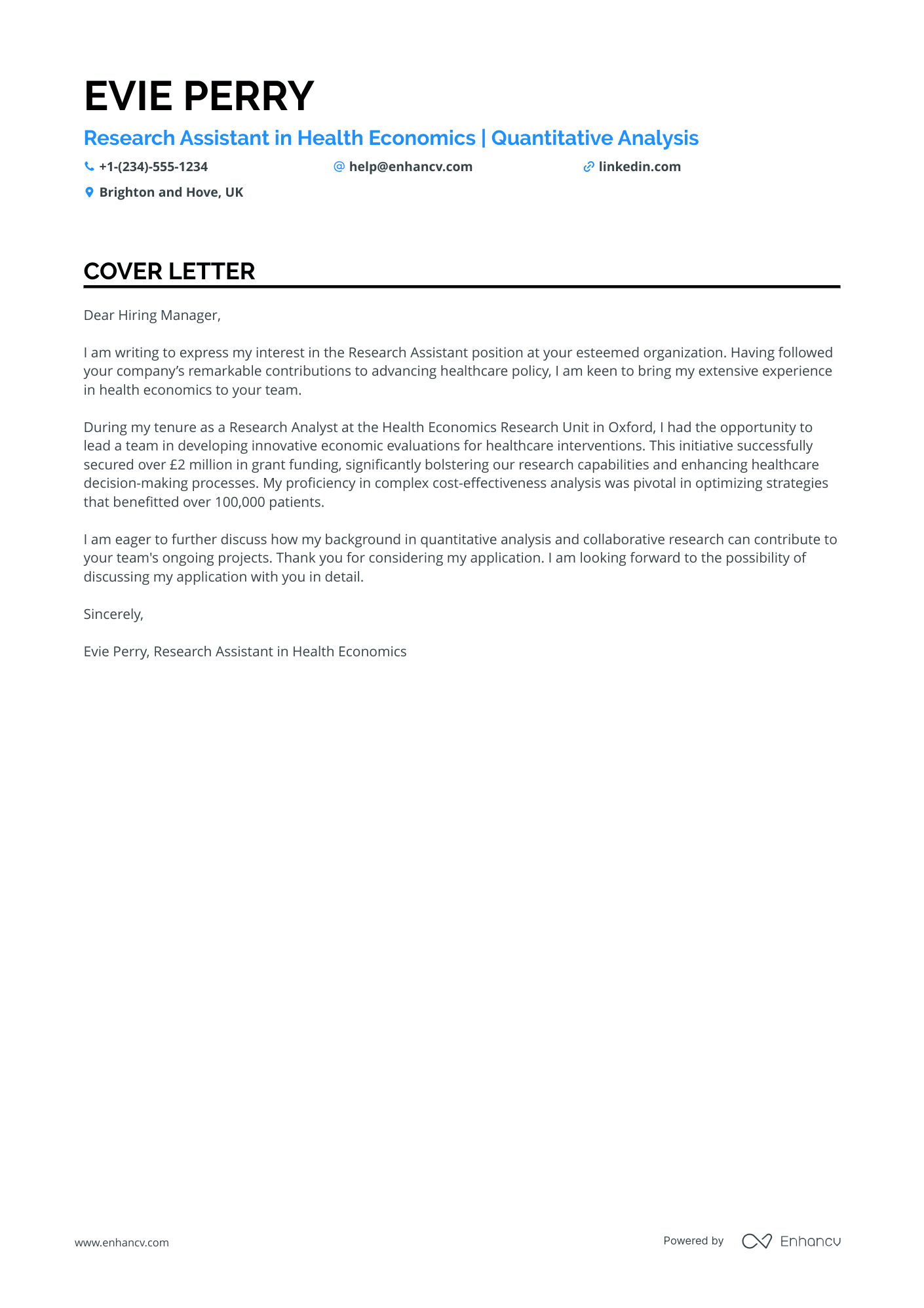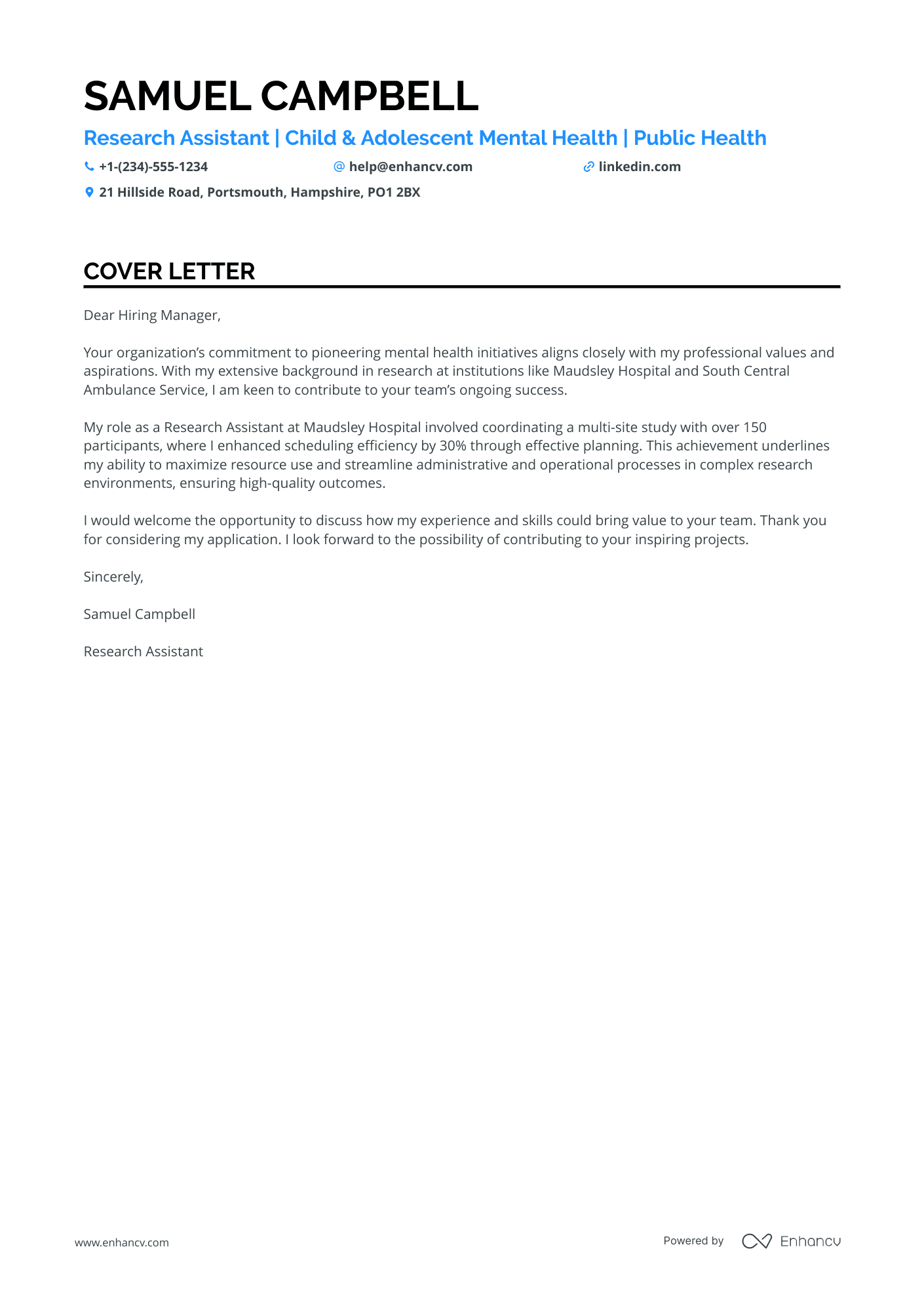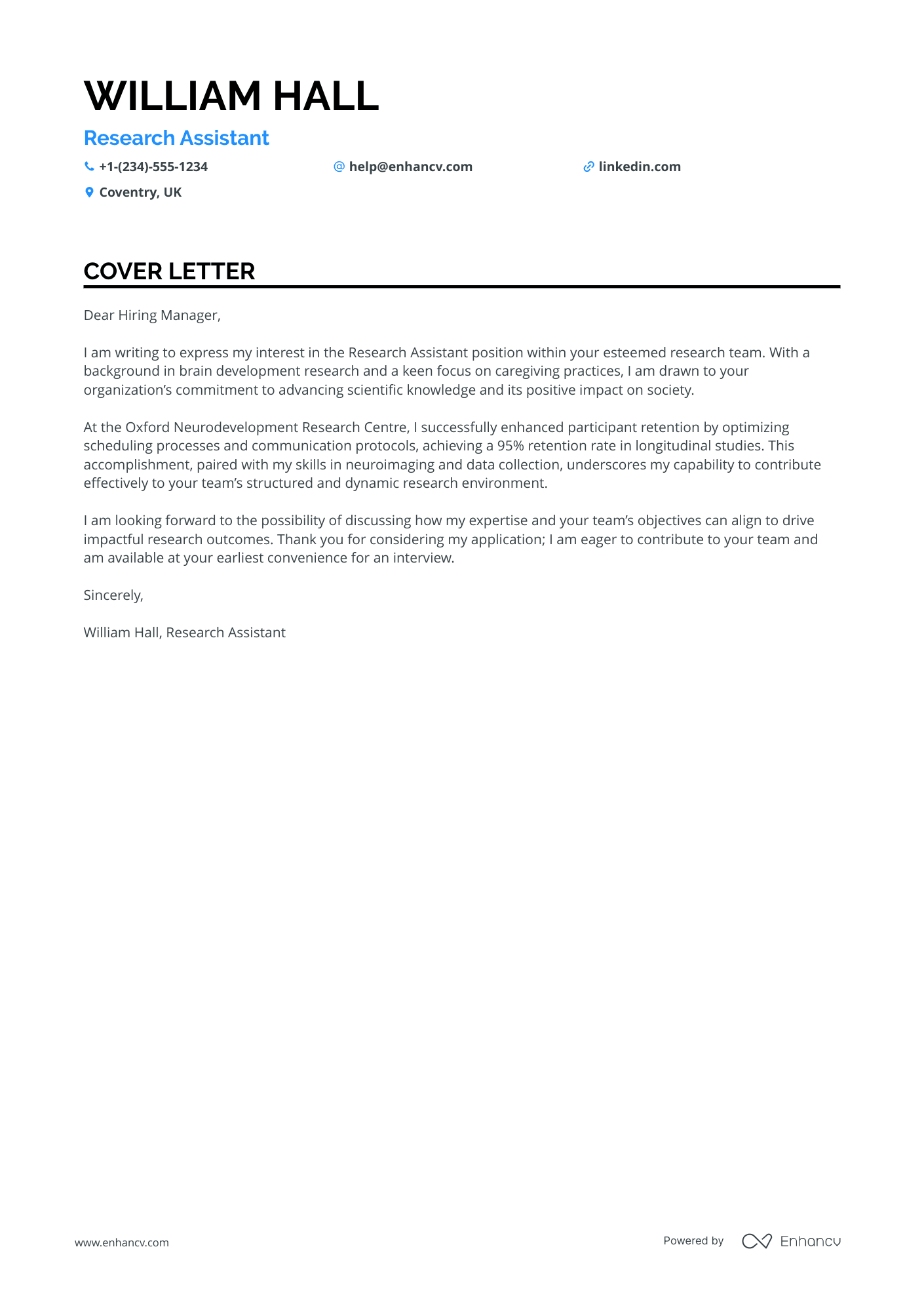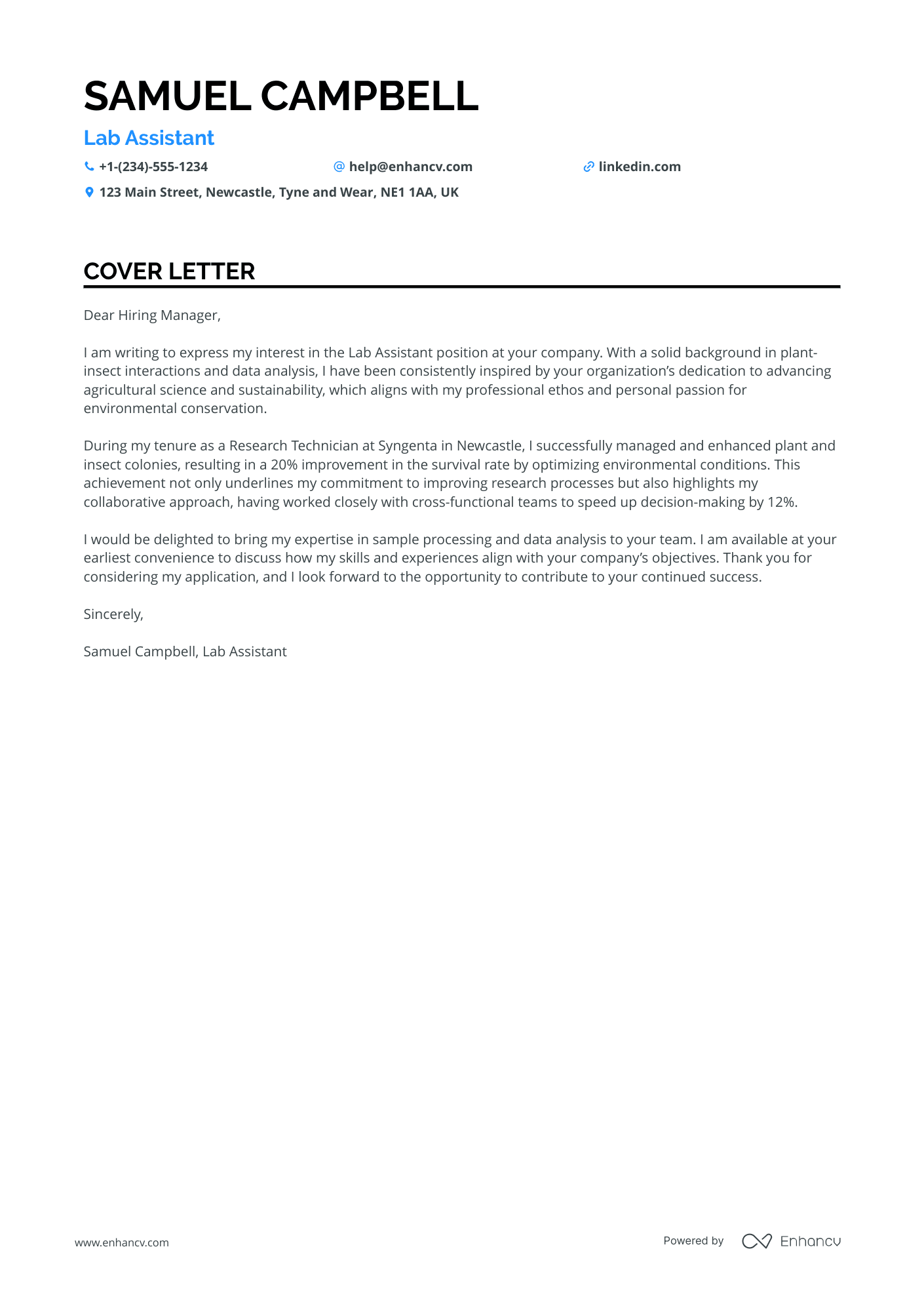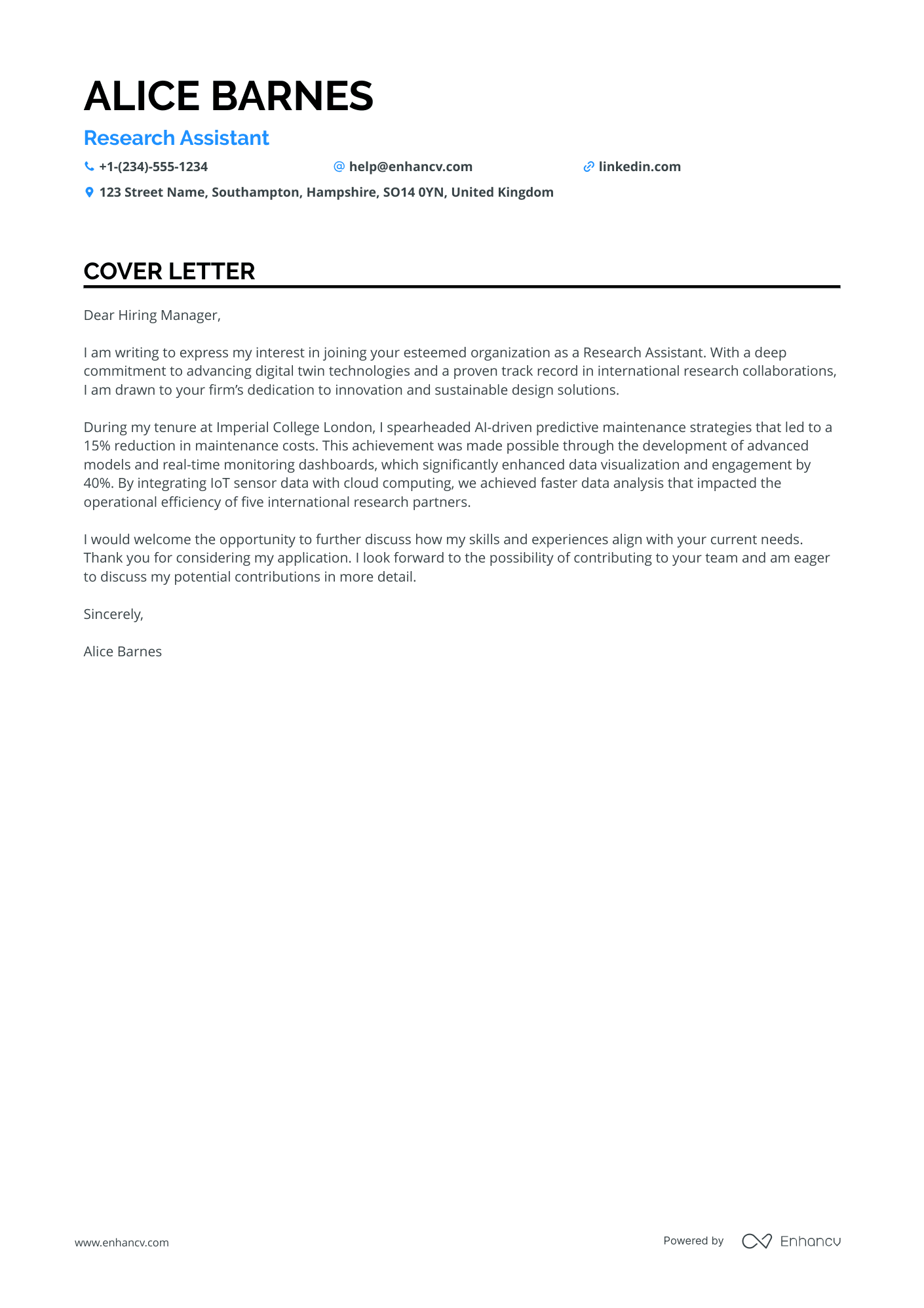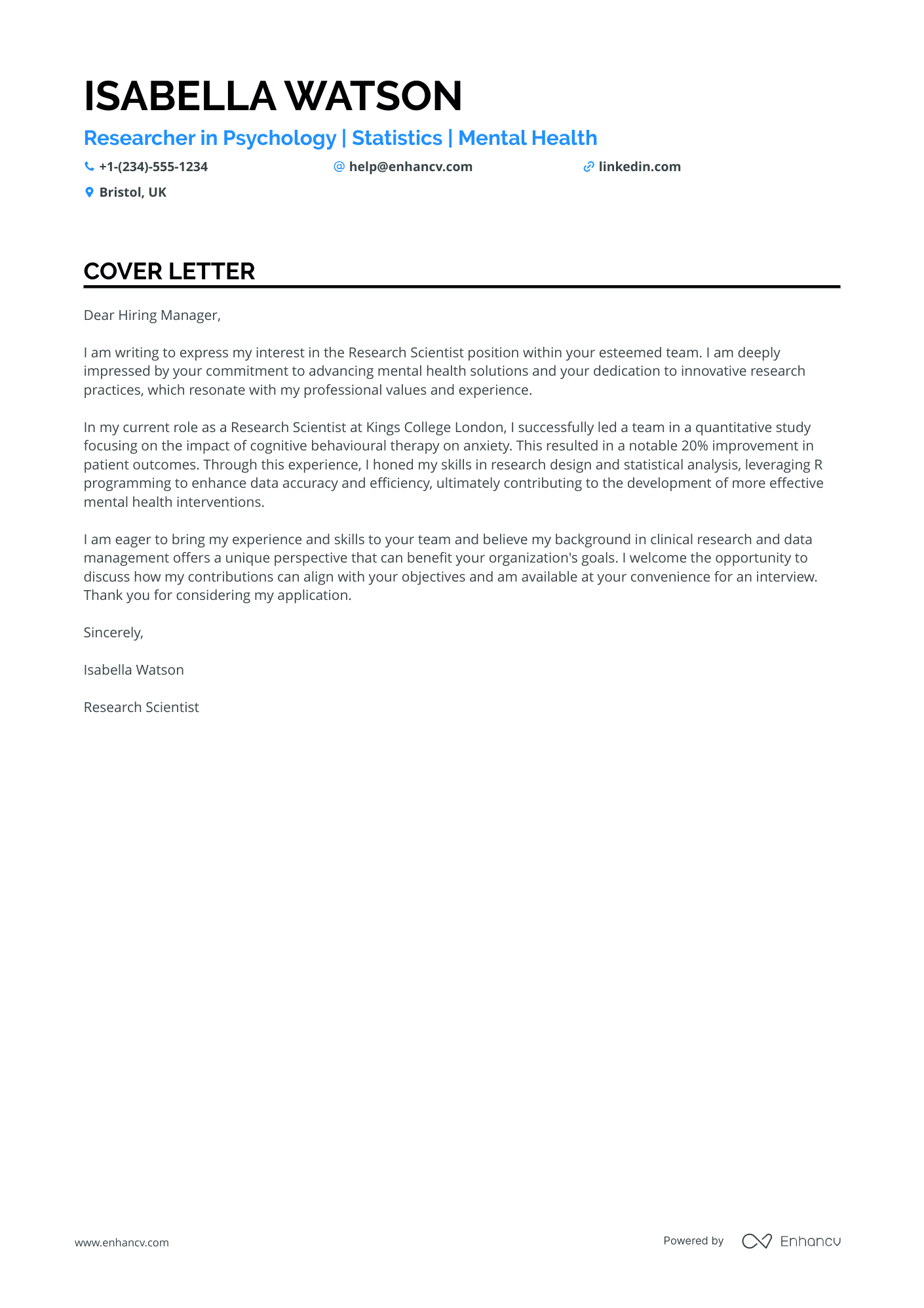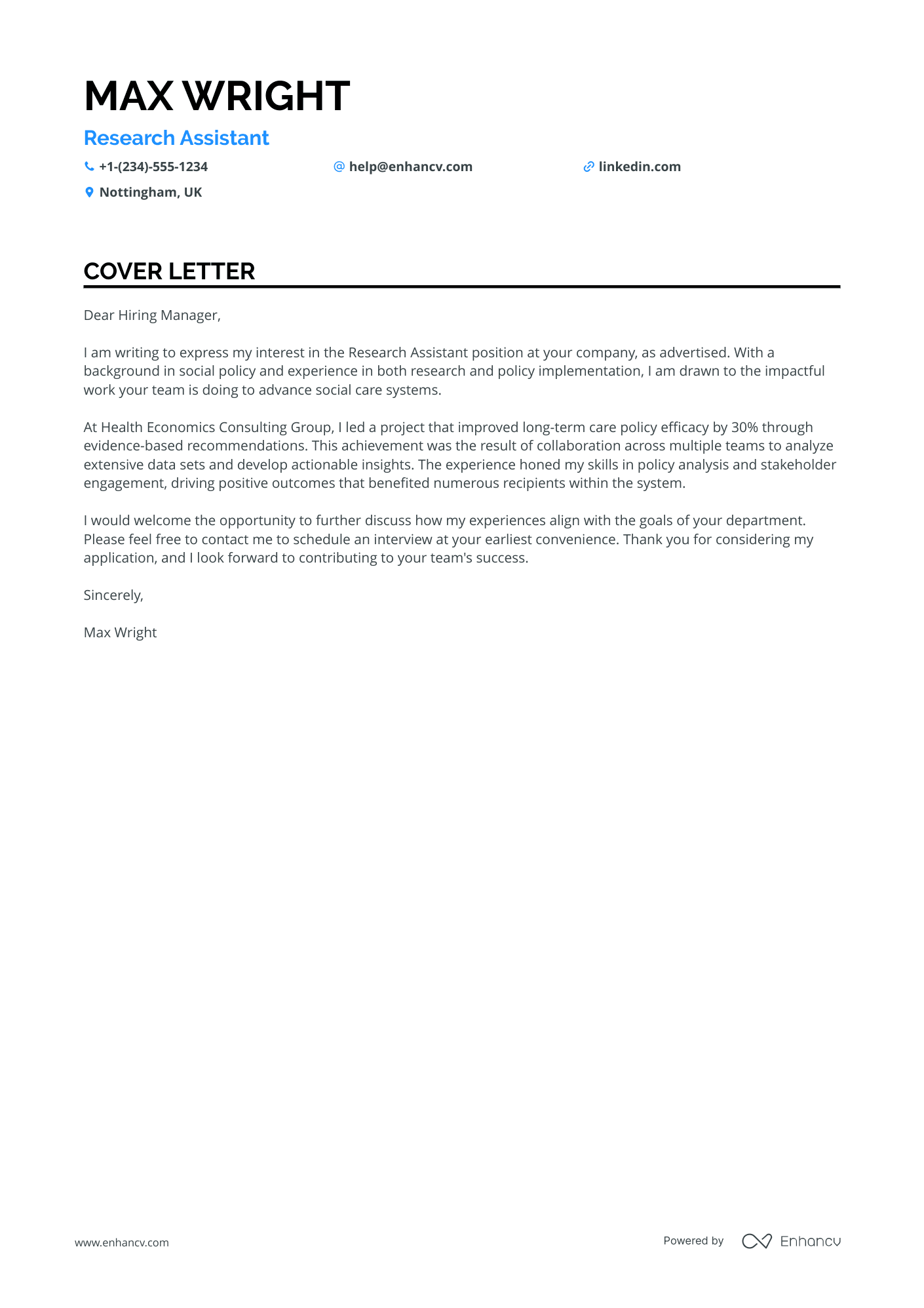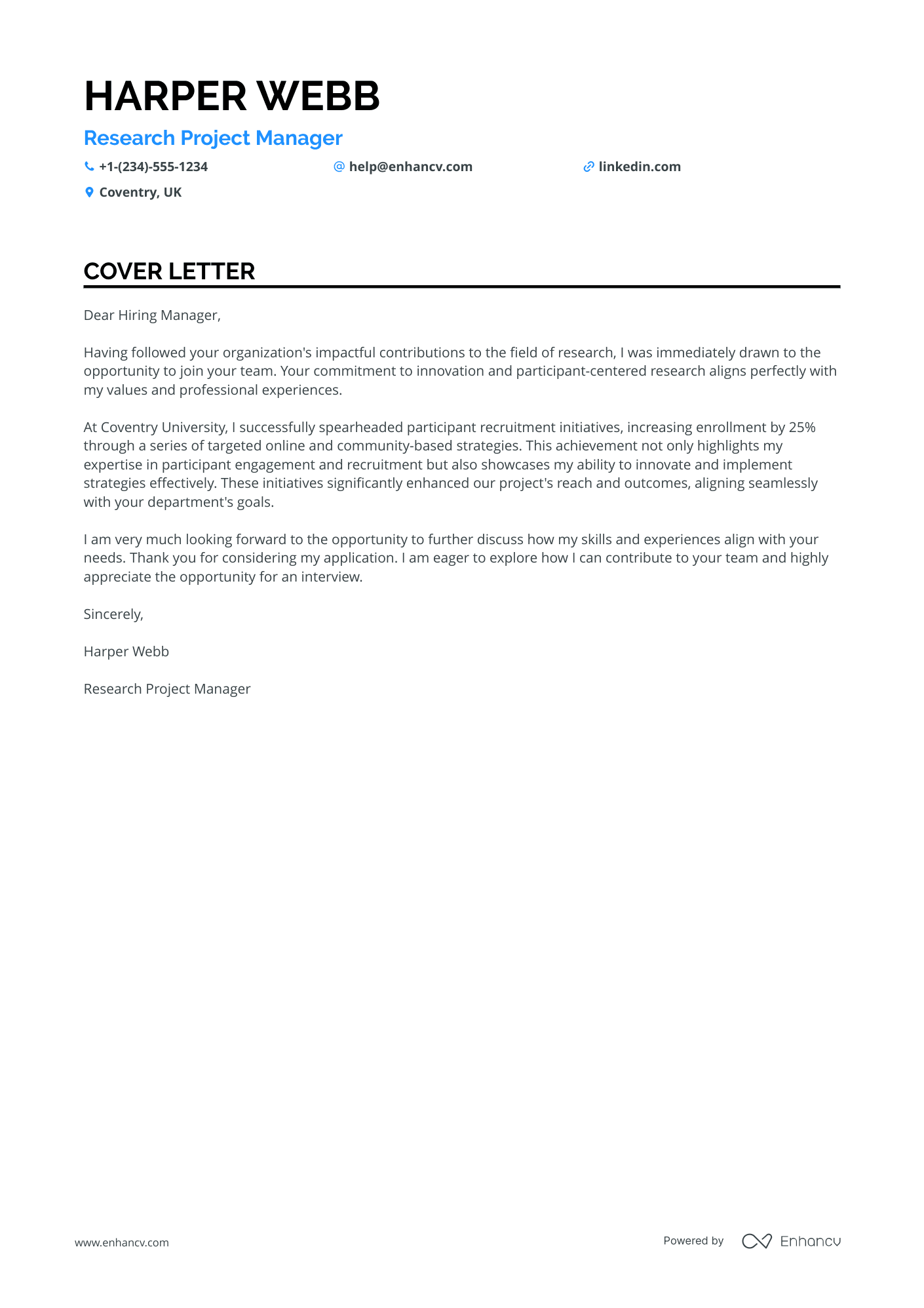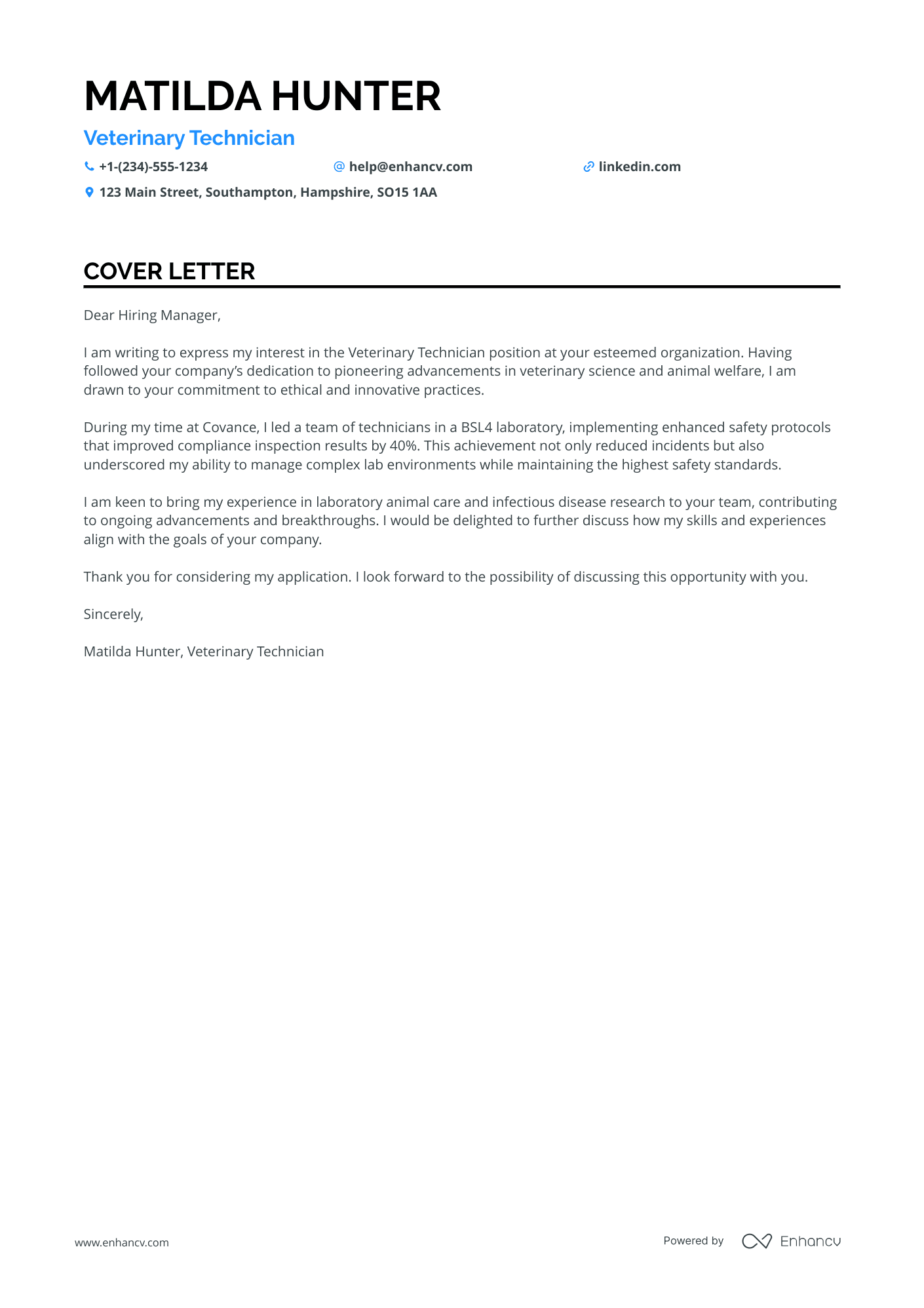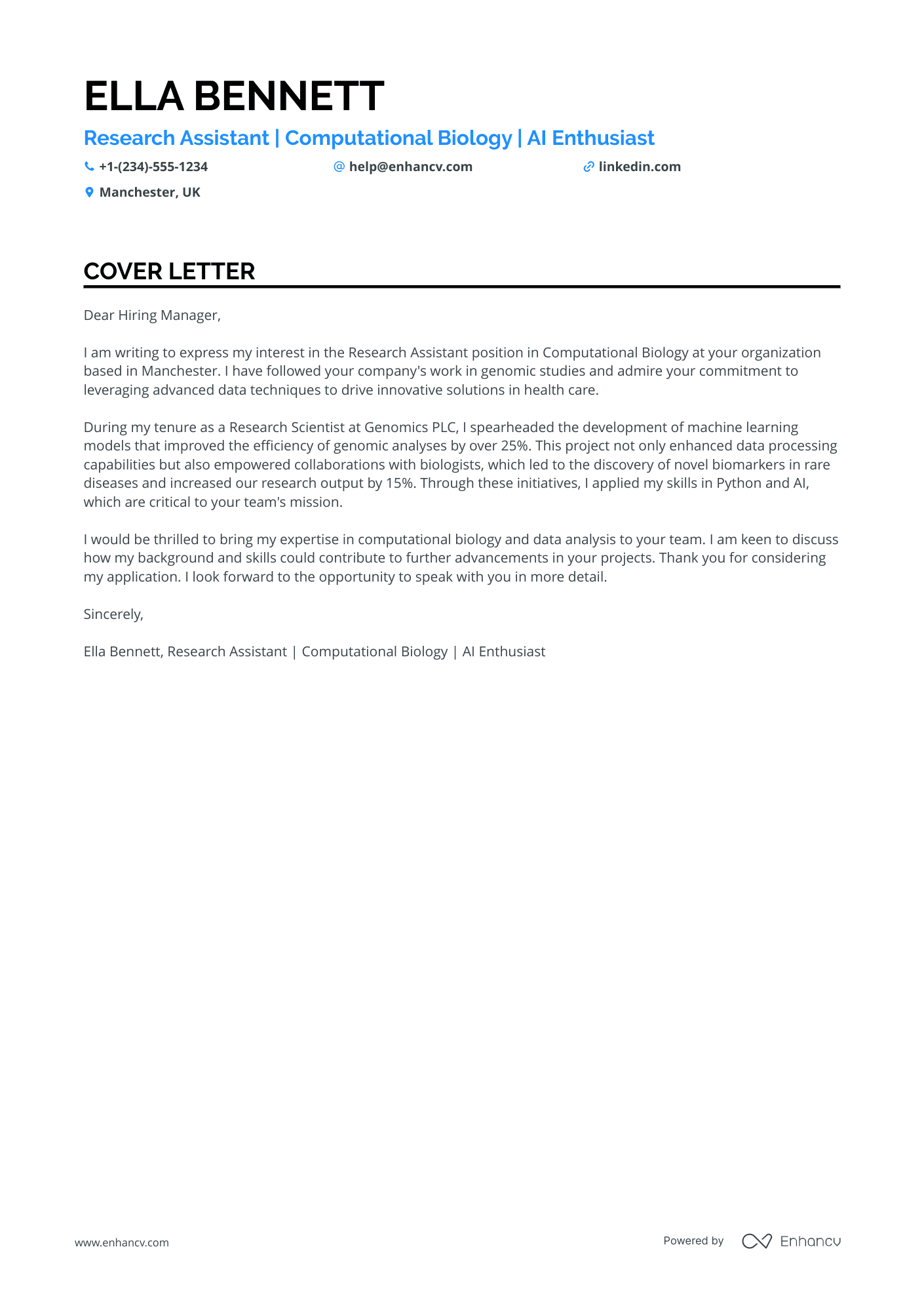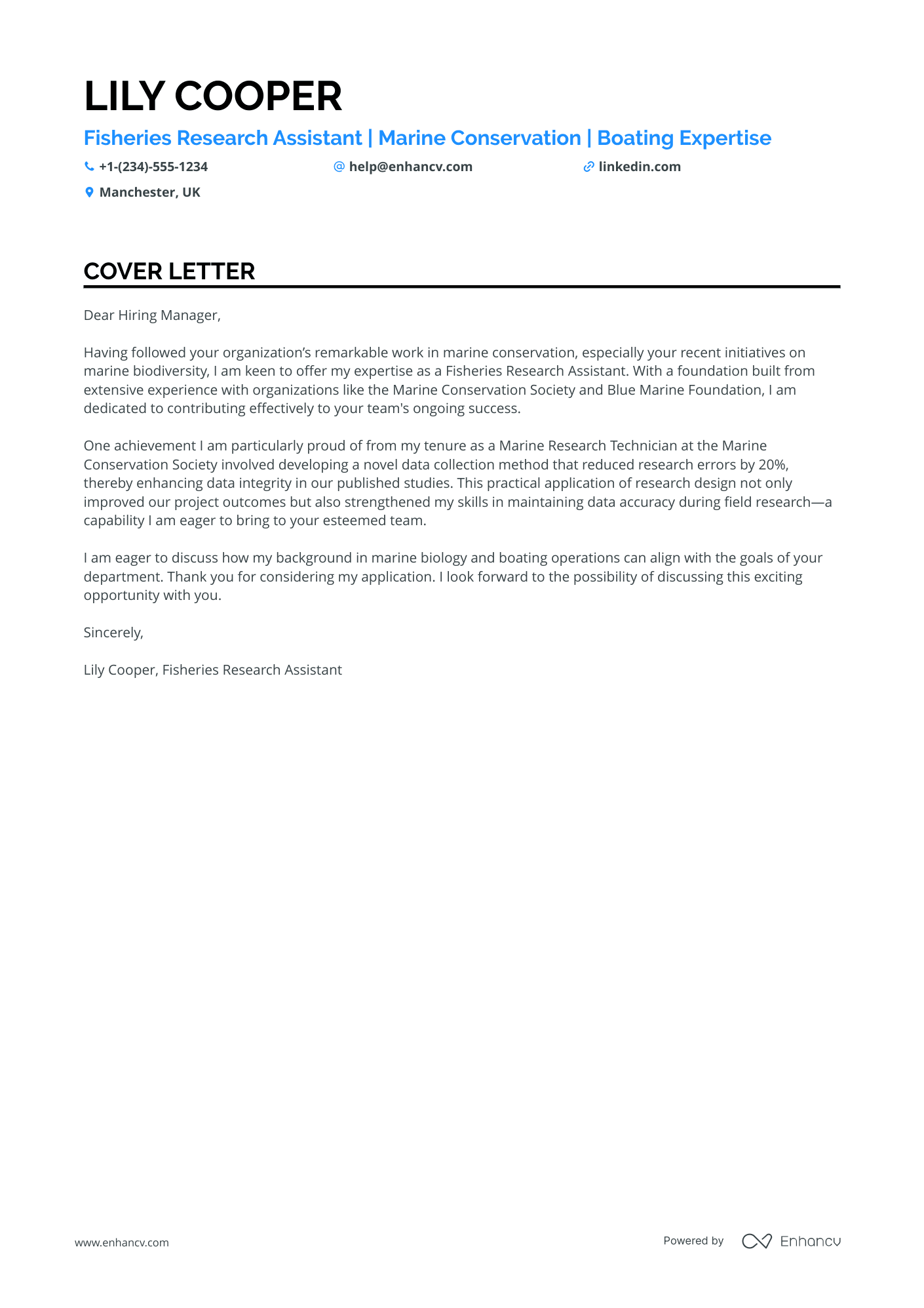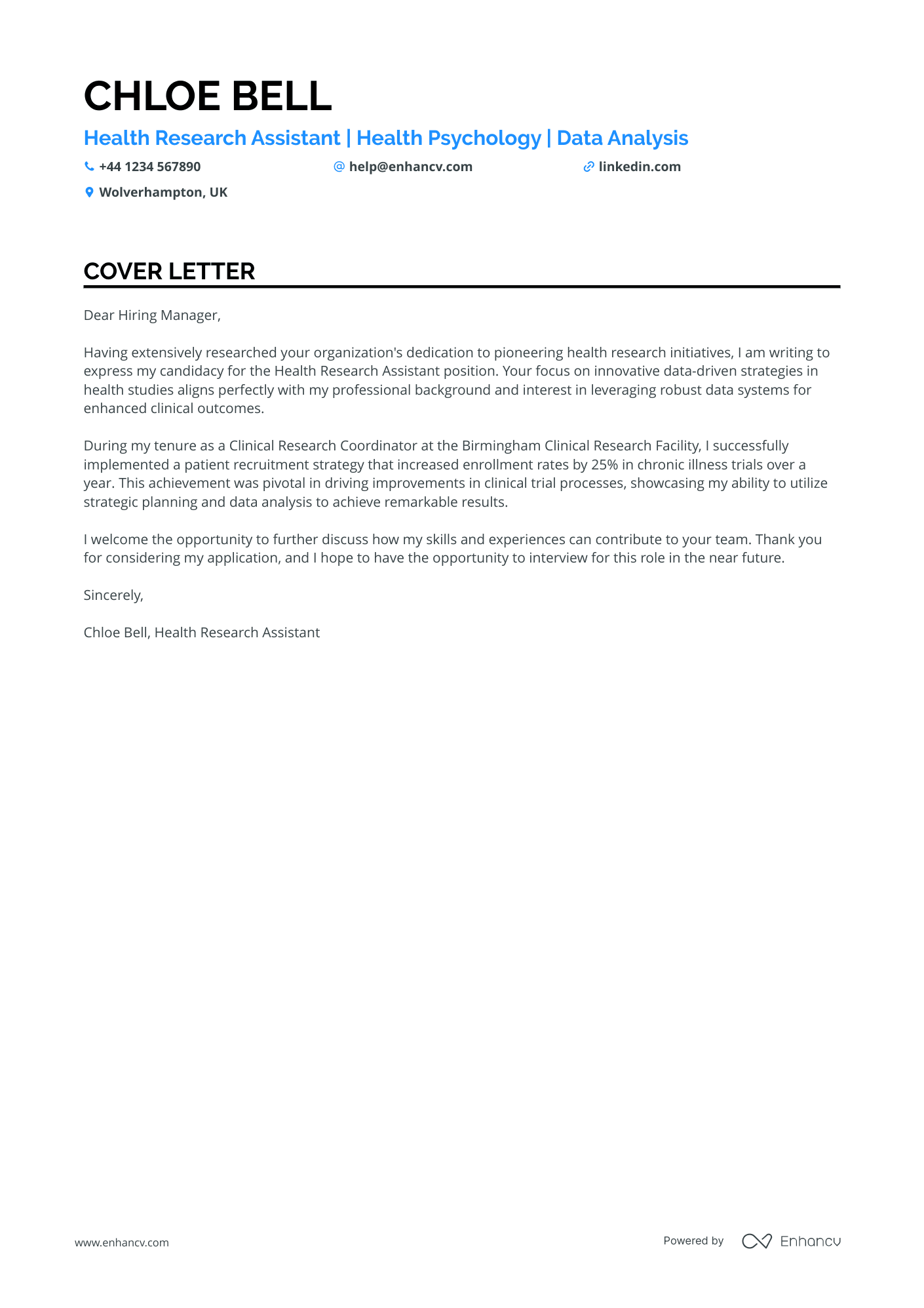You want your cover letter to strike the perfect balance between being professional and showing some personality. But how do you achieve this?
If you write too formally, your tone may come across as stiff. If you're too casual, it may sound overly conversational.
While modesty is always valued, how can you confidently present your skills without sounding arrogant or boastful?
This guide will help you find the right balance, ensuring your cover letter is both professional and personable, while focusing on the key job requirements.
Cover letter examples for research assistant
By Experience
Senior Research Assistant in Biochemistry
- Emphasising relevant certifications such as "Advanced Epigenomics" and "Functional Genomics" to demonstrate additional expertise in specialised areas, which is highly valuable in research-focused roles.
- Highlighting key skills such as DNA sequencing, RT-PCR, and nucleic acid purification, showcasing technical competence necessary for executing complex molecular biology projects effectively.
- Detailing specific achievements like improving DNA sequencing accuracy by 20% and optimising lab inventory systems to illustrate the potential for impact on laboratory efficiency and data quality.
- Incorporating previous experience in enhancing communication and data visualisation, underscoring the ability to effectively convey complex research findings, essential for collaborative academic environments.
Graduate Research Assistant in Psychology
- Emphasising Key Experience: Highlighting roles such as Clinical Psychology Research Associate and Psychology Research Coordinator showcases a robust background in project management and research execution specific to the psychology field.
- Showcasing Achievements: Listing specific accomplishments, such as reducing expenditure and increasing research report quality, demonstrates the ability to produce tangible, positive impacts in previous positions.
- Highlighting Publications and Speaking Engagements: Mentioning publications in high-impact journals and delivering keynote speeches underscores expertise and thought leadership in psychology research.
- Featuring Academic and Professional Credentials: Including education details like an MSc in Clinical Psychology and courses such as Ethical Research in Clinical Psychology illustrates relevant qualifications, bolstering credibility for the role.
Junior Research Assistant in Astrophysics
- Emphasise Specific Expertise: Highlight your experience and key skills in microbial genomics and sequencing data analysis, as these are crucial for a Research Assistant role in this specialised field.
- Showcase Achievements: Mention tangible outcomes, such as improving sample processing efficiency by 25% and increasing sequencing throughput by 40%, to demonstrate your ability to drive results.
- Relevant Presentations and Publications: Outline any instances where you've presented findings, like at the National Microbiome Conference, or published co-authored papers to underline your active contribution to the scientific community.
- Education and Continuous Learning: Highlight relevant degrees and completed courses, such as the B.Sc. in Biology and Advanced Sequencing Technologies course, to show your commitment to staying updated in your field.
Lead Research Assistant in Genetics
- Emphasising Specialised Expertise: The cover letter focuses on Charlotte's specialised knowledge in chilling stress mechanisms and plant physiology, which is critical for a role centred on maize resilience to environmental stress.
- Highlighting Leadership and Collaboration: It effectively presents Charlotte's leadership in managing research projects and collaborating internationally, demonstrating her capacity to lead complex projects and work within diverse teams.
- Project and Publication Success: The letter illustrates achievements such as a significant increase in maize yield and the high citation rate of her publications, underscoring both research impact and practical outcomes linked to her work.
- Relevant Achievements: By showcasing achievements like successful grant acquisition and the development of new research protocols, the cover letter highlights Charlotte's ability to secure funding and innovate in her field.
By Role
Clinical Research Assistant
- Emphasising Certifications: Highlighting certifications such as the "Certified Phlebotomy Technician (CPT)" and "Good Clinical Practice Certification" demonstrates specialised skills and commitment to maintaining high clinical and research standards.
- Showcasing Achievements: Including specific achievements like improving patient satisfaction by 20% and enhancing data accuracy by 30% helps demonstrate a track record of success and tangible contributions to previous roles.
- Demonstrating Core Competencies: Skills such as clinical documentation, phlebotomy, and research compliance are crucial for a healthcare assistant role and should be strategically highlighted to align with job responsibilities.
- Effective Use of Metrics: Using specific metrics, like reducing patient wait times by 15% or improving operational efficiency by 25%, provides evidence of capability in managing practical healthcare improvements.
Environmental Research Assistant
- Relevant Experience: Alfie highlights their extensive experience as a Legal Assistant, Paralegal, and Junior Legal Analyst, showcasing a progressive career path in legal roles with a focus on environmental issues.
- Skill Emphasis: The cover letter effectively emphasises key skills such as legal document preparation, proofreading, and legal research, which are crucial for a Legal Assistant position.
- Specialised Training: Mentioning courses related to Advanced Legal Research and Environmental Law underscores specialised knowledge, aligning with industry-specific expectations and showcasing commitment to professional development.
- Achievements and Results: Alfie presents quantifiable achievements, such as improvements in document retrieval and successful legal contributions, demonstrating their impact on team efficiency and case outcomes.
Research Assistant in Media Studies
- Specialised Expertise: The cover letter highlights a specific focus on Asian policy analysis, which is crucial for a Research Assistant role in Asian Studies.
- Professional Achievements: Clearly stating achievements such as increased conference attendance and published op-eds emphasises the candidate's impact in the field and dedication to engaging public discourse.
- Relevant Skills: Mentioning skills like policy writing, project management, and data analysis aligns well with the responsibilities of the role, indicating the candidate's preparedness for the job's demands.
- Passion and Engagement: Demonstrating a passion for Asian Cultural Studies and Public Policy Innovation provides insight into the candidate's genuine interest and long-term commitment to the field.
Pharmaceutical Research Assistant
- Highlighting Specialised Certifications: The inclusion of the "Good Clinical Practice Certification" showcases adherence to essential standards in clinical trials, which is pivotal for roles in virology and biomedical research.
- Demonstrating Impactful Achievements: The mention of a 30% improvement in lab throughput and 15% operational cost reduction exemplifies the applicant's ability to make significant contributions that benefit the organisation.
- Emphasising Collaborative Experience: The cover letter effectively describes collaborative work, such as leading teams and working with cross-functional groups, which is crucial for achieving success in research environments.
- Relevant Skillset Emphasis: Skills like RT-qPCR, tissue culture, and data analysis are directly relevant to the research assistant position, ensuring the applicant’s capabilities align with the job's demands.
Research Assistant in Public Health
- Quantitative Analysis and Economic Evaluation: Emphasising the applicant's strong skills in quantitative analysis and economic evaluation aligns directly with the health economics research role, showcasing their competence in delivering complex analyses.
- Securing Research Funding: Highlighting the ability to secure substantial research funding demonstrates leadership and resourcefulness, both essential for advancing projects within a health economics framework.
- Publication and Conference Presentations: Noting the publication record and presentation experience at international conferences highlights the applicant's capability to contribute to and influence the scientific community, a valuable asset for a research assistant position.
- Cross-disciplinary Collaboration: Demonstrating experience in collaborating with multidisciplinary teams shows adaptability and the ability to integrate economic analysis into broader healthcare research, enhancing the potential impact of their work.
Research Assistant in Educational Development
- Highlighting Relevant Experience: The cover letter effectively showcases Samuel's experience as a Research Assistant in child and adolescent mental health, emphasising key responsibilities and accomplishments like improving scheduling efficiency by 30% and achieving a 95% data accuracy rate, which are highly relevant for the role.
- Emphasising Specific Achievements: The cover letter highlights significant achievements such as enhancing participant retention rates by 20% through developing culturally sensitive measures, demonstrating Samuel's ability to implement practical solutions that improve research outcomes.
- Mentioning Professional Certifications: Mentioning the completion of courses like 'Foundations of Good Clinical Practice' indicates a commitment to maintaining high ethical and quality standards in research, which is crucial for roles involving data collection and participant interaction.
- Showcasing Passion for the Field: By listing passions such as advocating for improved mental health resources and engaging in community volunteering, the cover letter conveys Samuel's dedication to the mental health field beyond professional responsibilities.
Research Assistant in Human Resources
- Emphasising specific expertise in neuroimaging and EEG aligns with the technical requirements of a Research Assistant position in brain development.
- Highlighting achievements such as a 25% increase in participant enrolment and a 95% participant retention rate showcases successful recruitment and engagement strategies, critical skills in research environments.
- Discussing management and coordination tasks, such as supervising undergraduate students and managing participant communication channels, reflects strong leadership capabilities beneficial for team-based research settings.
- Including quantitative accomplishments, like a 15% increase in study efficiency and a 10% cost reduction initiative, demonstrates effective problem-solving and resource management skills necessary for impactful research work.
Research Assistant in Agricultural Science
- Emphasising Relevant Experience: Highlighting the role as a Research Technician at Syngenta demonstrates direct experience in tasks such as maintaining plant and insect colonies, which is crucial for a Lab Assistant position focused on plant-insect interactions.
- Showcasing Achievements: Mentioning a 20% improvement in survival rate and a 15% enhancement in data accuracy illustrates the candidate's capability to deliver measurable results, an asset in laboratory roles.
- Highlighting Cross-Functional Collaboration: The ability to work with cross-functional teams and enhance decision-making processes by 12% is valuable for roles that require collaborative problem-solving and information sharing.
- Demonstrating Continuous Learning: Courses like "Advanced Plant Biology" and achievements such as presenting at an international conference and publishing in a scientific journal show a commitment to ongoing education and professional development, enhancing expertise in plant-insect interactions.
Research Assistant in Urban Planning
- Demonstrating Technical Expertise: The cover letter effectively highlights the candidate's proficiency in digital twin and AI technologies, showcasing relevant skills such as data modelling, predictive maintenance, and machine learning, essential for a Research Assistant role.
- Relevant Experience and Impact: The inclusion of tangible outcomes in previous projects, like a 30% increase in data accuracy, showcases the candidate's ability to deliver impactful results, a critical factor for research-driven positions.
- Education and Certifications: The emphasis on an MSc in Data Science and a course on Advanced Digital Twin Technologies aligns well with the technical demands of the role, establishing credibility and a strong foundation in the subject matter.
- Collaborative and Multidisciplinary Approach: Highlighting collaboration with international teams and participation in EU Horizon projects underlines the candidate's ability to work in diverse environments, a valuable trait for research positions requiring global coordination.
Research Assistant in Data Science
- Emphasising Quantitative Research Skills: The cover letter effectively highlights the applicant's experience with statistical analysis and automation of data processes, essential skills for a Research Scientist in Psychology.
- Demonstrating Published Work: By mentioning peer-reviewed articles and high-impact papers, the letter establishes the candidate's authority and credibility within the academic and mental health research communities.
- Interdisciplinary Collaboration: The cover letter underscores the applicant's ability to work with diverse teams, a valuable trait for research roles involving multifaceted mental health initiatives.
- Commitment to Ethics and Open Science: The candidate's dedication to ethical research practices and open science initiatives is highlighted, showcasing a commitment to integrity and transparency in scholarly work.
Research Assistant in Economic Policy
- Highlight Relevant Experience: Emphasise your role in improving long-term care policy efficacy by 30% and your impact on national health strategies, which are directly relevant to a research assistant position in social policy and health economics.
- Demonstrate Leadership and Collaboration: Mention your experience in leading teams and managing stakeholder relationships, showcasing your ability to work collaboratively and drive results within cross-functional teams.
- Showcase Research and Analytical Skills: Highlight your expertise in both qualitative and quantitative methods, as well as your achievements in enhancing research accuracy and developing innovative data analysis tools.
- Communicate Your Passion: Talk about your passion for social care policy and mental health advocacy, reflecting your dedication to driving positive changes in these fields and your motivation to contribute meaningfully to the organisation's goals.
Research Assistant in Cultural Studies
- Explicitly highlights relevant achievements such as spearheading participant recruitment initiatives and streamlining data management systems, which are crucial for a Research Project Manager role.
- Mentions specific skills like qualitative analysis, project coordination, and participant engagement, showing a well-rounded capability for managing complex research projects.
- References specific courses completed, such as "Qualitative Data Analysis with NVivo" and "Project Management for Research," demonstrating a commitment to continuous professional development.
- Emphasises past experiences in improving data collection efficiency and participant retention, both of which are key for maintaining high standards in research project management.
Research Assistant in Veterinary Science
- BSL4 Safety Protocol Certification: Highlighting specific certifications like the BSL4 Safety Protocol Certification is crucial for specialised roles, emphasising expertise in high-containment settings.
- Quantifiable Achievements: Incorporating statistics, such as a 25% increase in research efficiency and a 40% improvement in safety compliance, demonstrates tangible contributions and results.
- Team Leadership and Training: The ability to develop training programmes and lead teams effectively is essential in ensuring compliance and improving productivity, both vital for laboratory environments.
- Publication in Scientific Journal: Including participation in significant research projects leading to publication highlights the candidate’s capability to contribute to high-impact scientific work.
Research Assistant in Artificial Intelligence
- Highlighting Specialised Certifications: The cover letter effectively showcases advanced courses in machine learning and deep learning specialisations, which are pertinent credentials for a role focused on AI and computational biology.
- Emphasising Leadership and Collaboration: By detailing experience in mentoring junior scientists and collaborating on grant proposals, it underscores important leadership and team-working skills crucial for a research-focused position.
- Showcasing Research Impact and Innovation: The mention of co-authoring a published research paper and developing innovative machine learning algorithms highlights the candidate’s ability to contribute valuable insights and solutions to the field.
- Demonstrating Passion and Commitment: By including passions related to biomedical data analysis and AI in healthcare, it indicates a strong motivation for professional growth in the field, which is highly attractive to employers.
Research Assistant in Marine Biology
- Emphasise Relevant Experience: Highlight your proficiency in marine research and conservation, specifically mentioning projects that increased data accuracy and community engagement, as this experience is crucial for a Fisheries Research Assistant role.
- Certifications Highlight: Mention certifications like STCW Basic Safety Training and Advanced VHF Radio Operations, which underscore your preparedness and capability in marine environments and enhance your candidacy for positions that require on-water proficiency.
- Skill Set Showcasing: Point out your skills in project management, boating operations, and VHF communication, demonstrating both your technical proficiencies and your ability to manage and conduct successful marine projects.
- Community Engagement: Detail your success in leading community awareness campaigns and partnerships, showing your ability to engage and educate stakeholders, which is an asset in roles focused on conservation and public education.
Research Assistant cover letter example
Chloe Bell
Wolverhampton, UK
+44 1234 567890
help@enhancv.com
- Alignment with Organizational Values: The cover letter effectively showcases the applicant's knowledge of and alignment with the company's focus on pioneering health research initiatives. Tailoring the letter to the specific goals and values can leave a strong impression.
- Quantifiable Achievements: The mention of a 25% increase in patient enrollment rates demonstrates the candidate's capacity to contribute to tangible improvements in research outcomes, emphasizing results-oriented experience.
- Relevant Experience: Highlighting the specific role of Clinical Research Coordinator and its related responsibilities helps in establishing direct relevance and experience in the field of health research.
- Call to Action: Including a polite expression of interest to discuss the candidate's fit for the role can show eagerness and initiative, essential traits for a research assistant position.
Importance of cover letters in the United Kingdom
Cover letters are a vital part of professional job applications, helping shape recruiters' first impression of your profile.
Here’s why they’re important:
- Indicates your genuine interest: A well-researched cover letter reflects your knowledge of the company and role.
- Professionalism from the outset: Employers expect your cover letter to be structured, polite, and formal. If you wish to add a more personalised touch, be sure to address your recipient directly.
- Capture the recruiters' attention: For most roles, candidates tend to have rather similar experience, which is why you should use your cover letter to explain what is unique about your profile.
What UK employers expect from a cover letter
Want to make an excellent first impression on your UK employers with your cover letter?
Here are three handy tips and tricks to keep in mind when creating yours:
- Take the time to research: Invest in learning about the company and role by exploring their website, social media, and doing a thorough Google search. Focus on the products and services they offer, as well as awards and industry recognitions.
- Focus on the company's values: Refer back to your research and to uncover what the company believes in. Integrate those values into your cover letter by explaining how you embody them. For example, if they value diligence, highlight how you’ve consistently met tight deadlines or successfully managed heavy workloads.
- Align your skills with the job requirements: Read the job advert carefully and identify the most sought-after skills. Select the top three skills that you can substantiate with your most noteworthy achievements, to demonstrate your expertise in those areas.
How to format a research assistant cover letter
To get your cover letter's formatting right:
- Use a modern font like Lato, Raleway, or Chivo, rather than the overused Arial or Times New Roman.
- Set your cover letter to be single-spaced with 1-inch (2.5 cm) margins on all sides—our templates are automatically set up for you.
- Ensure both your CV and cover letter are consistent in font style and formatting.
- Always send your cover letter as a PDF to prevent alterations and preserve its layout.
When it comes to structuring your cover letter, follow this sequence: begin with your address and contact details, then the employer's details (i.e. name and address), and the date. Next, start with a personalised greeting, followed by your introductory, body, and closing paragraphs. Be sure to include a sign-off and your signature at the end.
Remember, although Applicant Tracking Systems (ATS) software, which may scan your CV for keywords, won't read your cover letter, it will be reviewed by recruiters.
How to write your research assistant cover letter salutation
Now it's time to make it personal—in your cover letter greeting, you should always address the hiring manager directly. Whenever possible, use their name, depending on how well you know them (e.g., 'Dear Mr Smith', 'Dear Abbie').
You can find their name by searching on LinkedIn (start by looking for the job posting and the recruiter), visiting the 'About' page of the company's website, or by calling reception or administration to enquire.
How to write your research assistant cover letter intro
A great option to begin your cover letter is by showing recruiters you've done your homework or research.
If the company has won an award or made headlines, congratulate them in your opening sentence, or express how impressed you are.
Provide this achievement as a reason why you admire the company, ensuring your tone remains genuine, sincere, and authentic.
How to write your research assistant cover letter body
Which makes for a stronger cover letter body: a long-winded account of everything you’ve ever done, or a focused achievement that’s directly relevant to the job?
Hint: recruiters prefer the second.
When writing your cover letter, select your most impressive achievement that:
- Directly aligns with the job description and role.
- Is quantifiable with tangible metrics like numbers or percentages.
- Maps out your hard and soft skills, showcasing what makes you unique.
- Tells the story of the impact you could have on the organisation.
How to write a closing paragraph
Now we’ve reached the closing paragraph of your cover letter. You might be tempted to end with a simple Yours sincerely, but don’t!
Instead, finish with a promise to enhance the company’s performance metrics (backed by your hard and soft skills), to develop as a professional, or something else that holds significance for the organisation. Whatever you choose, ensure to stand behind your words and be remain sincere.
Don’t forget to include a call to action, encouraging recruiters to suggest the best time to follow up for an interview or update.
Conclusion
A standout cover letter is crucial for making an strong impression in your job search in the UK market. Personalise your letter by addressing it to the hiring manager and aligning your skills with the job description.
Use concrete examples to highlight your greatest achievement and convey your enthusiasm for the position. Finally, ensure that both your cover letter and CV are presented professionally for a consistent application.
